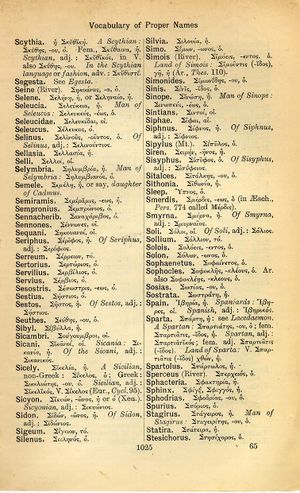Sicyon: Difference between revisions
Ὀργὴ φιλούντων ὀλίγον ἰσχύει χρόνον → Amantis ira ferre aetatem non potest → Der Zorn von Liebenden hat Macht nur kurze Zeit
(D_8) |
(3_12) |
||
| Line 9: | Line 9: | ||
{{Gaffiot | {{Gaffiot | ||
|gf=<b>Sĭcўōn</b>, ōnis, f. (m., Cic. Att. 1, 13, 1 ) (Σικυών), Sicyone<br /><b>1</b> [ancienne ville d’Achaïe, riche en oliviers, [[patrie]] d’[[Aratus]] : Cic. Off. 2, 81 ; Ov. P. 4, 15, 10<br /><b>2</b> ville d’Afrique : Plin. 37, 38. abl. e ; mais locatif i : Pl. Cist. 156 ; 190 ; Ps. 995. | |gf=<b>Sĭcўōn</b>, ōnis, f. (m., Cic. Att. 1, 13, 1 ) (Σικυών), Sicyone<br /><b>1</b> [ancienne ville d’Achaïe, riche en oliviers, [[patrie]] d’[[Aratus]] : Cic. Off. 2, 81 ; Ov. P. 4, 15, 10<br /><b>2</b> ville d’Afrique : Plin. 37, 38. abl. e ; mais locatif i : Pl. Cist. 156 ; 190 ; Ps. 995. | ||
}} | |||
{{Georges | |||
|georg=Sicyōn, ōnis, m. u. f. ([[Σικυών]]), [[Hauptstadt]] der [[Landschaft]] Sicyonia in dem nördl. Peloponnes, [[berühmt]] [[als]] [[sehr]] [[früher]] [[Sitz]] [[aller]] Künste u. Wissenschaften, der [[Lyrik]], der [[Malerei]] u. Bildhauerei, [[von]] Manufakturen u. Fabriken, [[bes]]. [[für]] [[Metall]], Geburtsort [[des]] [[Aratus]], j. wahrsch. Ruinen [[bei]] [[Camari]] od. Camares, Plaut. Curc. 395. (Fleckeisen Sicuonem); merc. 647; Pseud. 995 (Abl. lok. -oni; Fleckeisen Sicuoni). Cic. de off. 2, 81; ep. 13, 21, 2. Liv. 27, 31, 1 u. 27, 37, 5: die [[Umgegend]] [[berühmt]] [[durch]] treffliche Oliven, Ov. ex Pont. 4, 15, 10: dah. [[Sicyon]] olifera, Ov. Ib. 315. – Dah. Sicyōnius, a, um ([[Σικυώνιος]]), sikyonisch, aus od. zu Sikyon, [[Aratus]], Cic.: [[magistratus]], Cic.: [[ager]], Liv.: [[baca]] ([[Olive]]), Verg.: [[oleum]], Cael. Aur.: calcei, eine [[Art]] weicher Schuhe, Cic.: [[dies]]. subst. [[auch]] Sicyōnia, ōrum, n., Lucil. fr., Lucr. u.a. – / [[Sicyon]] [[als]] masc., Cic. ad Att. 1, 13, 1: [[als]] fem., Ov. Ib. 319. Stat. Theb. 2, 179 u. 4, 50. Iuven. 3, 69. – [[spät]]. Nbf. Sicyona, wov. Akk. Sicyonam, Oros. 3, 23, 15. | |||
}} | }} | ||
Revision as of 09:06, 15 August 2017
English > Greek (Woodhouse)
Σικυών, -ῶνος, ἡ or ὁ (Xen.).
Sicyonian, adj.: Σικυώνιος.
Latin > English (Lewis & Short)
Sĭcyon: ōnis (abl. e, rarely i), f. (but
I masc. Cic. Att. 1, 13, 1), = Σικυών, the capital of the territory of Sicyonia in the Peloponnesus (now Vasiliko), near the isthmus, sometimes considered as belonging to Achaia, abounding in olive-trees, the birthplace of Aratus, Mel. 2, 3, 10; Plin. 4, 5, 6, § 12; Cic. Off. 2, 23, 81; id. Fam. 13, 21; id. Att. 1, 13, 1; Ov. Ib. 315; id. P. 4, 15, 10; Plaut. Curc. 3, 25; id. Merc. 3, 4, 62 al.—Abl. Sicyoni, Plaut. Cist. 1, 3, 8; 1, 3, 42; id. Ps. 4, 2, 38; and Sicyone, id. Cist. 1, 2, 11; id. Ps. 4, 7, 80; Cic. Fam. 13, 21, 1 and 2.—Hence, Sĭcyōnĭus, a, um, adj., of or belonging to Sicyon, Sicyonian: ager, Liv. 33, 15: magistratus, Cic. Verr. 2, 1, 17, § 44: Aratus, id. Off. 2, 23, 81: calcei, a lcind of soft shoes, id. de Or. 1, 54, 231: baca, olives, Verg. G. 2, 519: ager, Liv. 43, 15.—As substt.
1 Sĭ-cyōnĭi, ōrum, m., the inhabitants of Sicyon, the Sicyonians, Cic. Tusc. 3, 22, 53; id. Att. 1, 19, 9; 1, 20, 4; 2, 1, 10 al.—
2 Sĭcyōnĭa, ōrum, n., Sicyonian shoes, Lucil. ap. Fest. s. h. v. p. 337 Müll.; Lucr. 4, 1125; Verg. Cir. 168; Auct. Her. 4, 3, 4.
Latin > French (Gaffiot 2016)
Sĭcўōn, ōnis, f. (m., Cic. Att. 1, 13, 1 ) (Σικυών), Sicyone
1 [ancienne ville d’Achaïe, riche en oliviers, patrie d’Aratus : Cic. Off. 2, 81 ; Ov. P. 4, 15, 10
2 ville d’Afrique : Plin. 37, 38. abl. e ; mais locatif i : Pl. Cist. 156 ; 190 ; Ps. 995.
Latin > German (Georges)
Sicyōn, ōnis, m. u. f. (Σικυών), Hauptstadt der Landschaft Sicyonia in dem nördl. Peloponnes, berühmt als sehr früher Sitz aller Künste u. Wissenschaften, der Lyrik, der Malerei u. Bildhauerei, von Manufakturen u. Fabriken, bes. für Metall, Geburtsort des Aratus, j. wahrsch. Ruinen bei Camari od. Camares, Plaut. Curc. 395. (Fleckeisen Sicuonem); merc. 647; Pseud. 995 (Abl. lok. -oni; Fleckeisen Sicuoni). Cic. de off. 2, 81; ep. 13, 21, 2. Liv. 27, 31, 1 u. 27, 37, 5: die Umgegend berühmt durch treffliche Oliven, Ov. ex Pont. 4, 15, 10: dah. Sicyon olifera, Ov. Ib. 315. – Dah. Sicyōnius, a, um (Σικυώνιος), sikyonisch, aus od. zu Sikyon, Aratus, Cic.: magistratus, Cic.: ager, Liv.: baca (Olive), Verg.: oleum, Cael. Aur.: calcei, eine Art weicher Schuhe, Cic.: dies. subst. auch Sicyōnia, ōrum, n., Lucil. fr., Lucr. u.a. – / Sicyon als masc., Cic. ad Att. 1, 13, 1: als fem., Ov. Ib. 319. Stat. Theb. 2, 179 u. 4, 50. Iuven. 3, 69. – spät. Nbf. Sicyona, wov. Akk. Sicyonam, Oros. 3, 23, 15.

